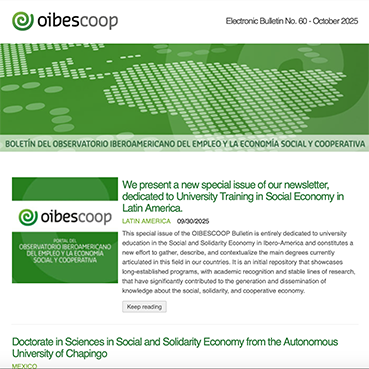The Social and Solidarity Economy (SSE) has emerged as a space for reflection, action, and social transformation that promotes an alternative vision of development — one that places the individual and their community at the center, based on the values of solidarity, equity, democracy, and sustainability. In the Ibero-American context, its progressive institutionalization has been accompanied by increasing academic attention, reflected in the growing number of university programs aimed at training professionals capable of leading processes of social, economic, and organizational innovation through the approaches of the SSE.
In this context, the Ibero-American Observatory on the Social and Cooperative Economy (OIBESCOOP) has published a special issue of its newsletter entirely dedicated to university education in the Social and Solidarity Economy in Ibero-America. This issue represents a new effort to gather, describe, and contextualize the main academic degrees that currently shape this field in these countries. It serves as an initial repository highlighting long-standing programs with academic recognition and stable lines of research that have significantly contributed to the generation and dissemination of knowledge on the social, solidarity, and cooperative economy.
According to OIBESCOOP, the purpose of this compilation is not only to provide a descriptive overview but also to help recognize the existence of a genuine educational ecosystem in the social and cooperative economy. This ecosystem is nourished by the convergence between professional practice, teaching, applied research, and collaborative networks, and it involves not only universities but also organizations and federations, public administrations, and social movements.
As a space for observation, dialogue, and dissemination, OIBESCOOP seeks, through this issue, to contribute to the academic mapping of the social economy in Ibero-America. It offers a reference tool for researchers and educators, students seeking relevant training for their future, and public authorities and organizations interested in promoting this model, under the shared conviction that the common goal is to train professionals and leaders committed to their communities.
The compilation presented does not exhaust the richness and diversity of the existing educational offer. There are many other training initiatives across countries and disciplines that make valuable contributions to strengthening the Social and Solidarity Economy. In fact, OIBESCOOP has already announced that this first issue on university education will be followed by a second edition, to be published in the first half of next year, along with a dedicated section on the OIBESCOOP website gathering all the programs presented.







